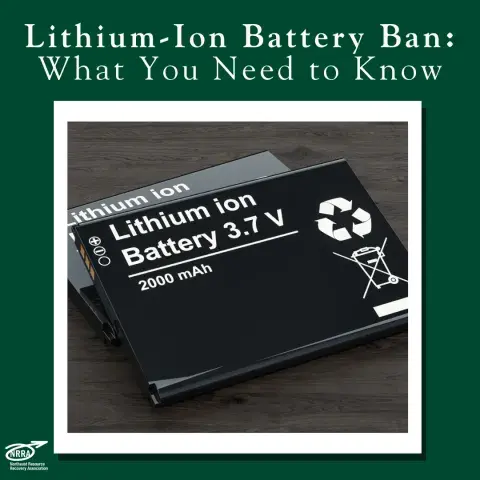
The most recent NRRA Member Operations & Marketing meeting included a special presentation about the upcoming lithium-ion battery ban, presented by Tara Albert, the Solid Waste Operator Training & Certification Coordinator with the NHDES Waste Management Division.
The ban goes into effect on July 1, 2025 and applies to everyone: residents, visitors, haulers, transfer stations, landfills, and waste-to-energy incinerators.
Lithium-ion batteries are rechargeable batteries that, when damaged, can cause catastrophic fires and explosions, while expelling toxic gasses. The chemical reaction is called, "thermal runaway." It is a chain reaction of uncontrolled heating within a battery, potentially leading to fire or explosion. Thermal reaction can be triggered by physical damage (when a battery is crushed with other MSW), overcharging, exposure to extreme temperatures, or manufacturing defects. A lithium-ion battery experiencing a thermal runaway may be bulging, hissing or popping, and may have visible gasses venting from its pouch or case.
Neither water nor fire extinguishers are effective on lithium-ion battery fires!
These battery fires are also at a much greater risk of reignition and must be carefully monitored. Lithium-ion batteries have been known to spontaneously reignite minutes, hours, or even days after all visible fire has been extinguished.
Across the US, recycling facilities and solid waste haulers (ie garbage trucks) have seen an increase in fires and explosions caused by lithium-ion batteries improperly thrown in the trash. Thus, this law was enacted to maintain fire safety at solid waste facilities.
Residents should always recycle rechargeable batteries. Stores such as Staples, BatteriesPlus, Best Buy, Call2Recycle, and even your local hardware store may have lithium-ion battery drop sites or recycling options.
Transfer Stations that accept lithium-ion batteries must collect and actively manage the batteries, prior to recycling them through an authorized facility.
Questions? Need help identifying a battery?
Residents should contact their local transfer station or the NHDES Household Hazardous Waste Program via email at hhw@des.nh.gov or by phone at (603) 271-2047. Businesses should contact the Hazardous Waste Helpline at 1-866-HAZ-WAST.
Looking for a Battery Recycling program?
NRRA has several vendors that may be able to help - reach out to our Member Services team for more information at info@nrrarecycles.org.
